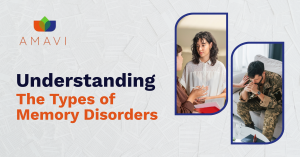Memory disorders encompass a range of conditions that impair an individual’s ability to recall, store, or process information. Identifying the early signs of these disorders is crucial for timely intervention and effective management. Early detection can differentiate between mild cognitive issues and more serious memory problems, allowing for appropriate treatment and planning.
Recent advances in research are making early detection more accurate, enabling interventions that can slow progression and improve quality of life. This blog will explore the distinctions between mild and severe memory issues, common early indicators, and the importance of seeking timely medical evaluation.
A Summary of Information Covered in this Blog
Recognizing the difference between normal forgetfulness and early signs of a memory disorder is key to early intervention and better outcomes. This article outlines how to spot those signs and why it’s important to seek medical help early.
Mild vs. Serious Memory Problems
- Mild memory lapses (e.g., forgetting names or misplacing keys) are often normal with aging and don’t disrupt daily life.
- Serious memory issues (e.g., forgetting recent events, getting lost, struggling with familiar tasks) tend to worsen and signal conditions like dementia or mild cognitive impairment (MCI).
Common Early Indicators
- Frequent forgetfulness that interferes with everyday life—such as asking the same question repeatedly or forgetting new information.
- Disorientation and confusion, even in familiar settings, or losing track of time and place.
Behavioral changes like mood swings, social withdrawal, or increased reliance on others for daily tasks can also signal early memory impairment.
Why Early Medical Evaluation Matters
- Early diagnosis enables personalized treatment, lifestyle changes, and the chance to slow disease progression.
- Medical evaluations may include memory and cognitive tests, brain imaging, and blood work to rule out treatable conditions.
- Early detection gives individuals and families time to plan for care, manage legal and financial matters, and access helpful resources.
The Takeaway
If you notice repeated memory lapses, confusion, or personality changes in yourself or someone close to you, don’t ignore them. Early evaluation can make a major difference in quality of life and long-term care planning. Taking action now is the first step toward better memory health.
1. Identifying Mild Cognitive Issues vs. Serious Memory Problems
Memory lapses are a normal part of aging, but not all memory issues are benign. Distinguishing between typical forgetfulness and more serious memory problems is essential for identifying underlying conditions early.
Mild cognitive issues often arise from normal aging or temporary factors such as stress, fatigue, or emotional strain. For example, someone might occasionally forget a name or an appointment but recall it later. Similarly, misplacing items like keys or glasses happens from time to time but typically doesn’t interfere with daily functioning. Mild lapses like these are infrequent, do not worsen significantly over time, and have a minimal impact on an individual’s overall ability to manage daily tasks.
In contrast, serious memory problems are more persistent and disruptive. These issues are often indicative of conditions such as mild cognitive impairment (MCI) or dementia. Individuals with serious memory problems may frequently forget recent conversations, important appointments, or significant events. They might struggle to follow familiar routines, such as preparing a well-known recipe, or become disoriented in previously familiar places. In severe cases, individuals may fail to recognize close friends or family members. While mild cognitive issues may stabilize or improve with lifestyle adjustments, serious memory problems tend to worsen over time and require medical intervention.
2. Common Early Indicators Like Forgetfulness and Disorientation
Early signs of memory disorders vary depending on the underlying condition, but several common symptoms often signal the need for further evaluation.
Forgetfulness is one of the earliest and most noticeable symptoms of memory disorders. While occasional forgetfulness is normal, patterns such as repeatedly asking the same questions despite receiving answers, forgetting newly learned information like names or directions, or failing to remember where items were placed even in logical locations may indicate a problem. These recurring instances of forgetfulness disrupt daily life and are distinct from typical aging-related lapses.
Disorientation and confusion, particularly in familiar settings, are significant red flags for memory impairment. Individuals may lose track of time, forgetting the day or even the year. They might get lost in previously familiar places, such as their own neighborhood or a local grocery store, and struggle to follow step-by-step instructions for tasks they previously found easy. For instance, a person may find it difficult to assemble a routine household item or follow a simple recipe, even with instructions in front of them.
Behavioral changes often accompany memory disorders and can affect emotional well-being. Mood swings, such as unexplained anger or irritability, may appear early on. Individuals might withdraw from social interactions or hobbies, driven by the fear of forgetting details or feeling embarrassed by their lapses. Increased reliance on others for tasks previously managed independently, such as paying bills or keeping track of appointments, is another common indicator. Identifying these early symptoms is vital for distinguishing between normal aging and potential memory disorders like Alzheimer’s disease or vascular dementia.
3. Importance of Seeking Timely Medical Evaluation
Timely medical evaluation is critical when early signs of memory disorders are observed. Early diagnosis can significantly improve outcomes by enabling prompt intervention, delaying disease progression, and enhancing quality of life.
One of the primary benefits of early diagnosis is the development of personalized treatment plans. Identifying the specific type of memory disorder allows for tailored interventions, such as medications, cognitive therapies, and lifestyle changes. For example, cholinesterase inhibitors are often effective in managing the symptoms of early-stage Alzheimer’s disease. Early intervention programs, such as memory training or brain-stimulating activities, are also more effective when started early in the course of the disorder.
In addition to treatment, early diagnosis provides individuals and their families the opportunity to plan for the future. This includes making legal and financial preparations, arranging caregiving support, and accessing community resources that can ease the challenges associated with memory disorders.
A comprehensive medical evaluation typically involves several steps. Cognitive tests, such as the Mini-Mental State Examination (MMSE), assess memory, attention, language, and problem-solving skills. Reviewing a patient’s medical history helps identify potential risk factors, such as head injuries or a family history of dementia. Imaging tools like MRI or CT scans detect structural changes in the brain, while PET scans identify Alzheimer’s-related biomarkers. Blood tests may rule out treatable causes of memory loss, such as vitamin B12 deficiency or thyroid disorders.
If you notice early signs of memory problems in yourself or a loved one, it is essential to act promptly. Consult a healthcare provider specializing in memory disorders, such as a neurologist or geriatrician, to determine the cause and establish an appropriate treatment plan.
Taking Action: The First Step Toward Better Memory Health
Memory disorders can begin subtly, with mild cognitive lapses that escalate over time. Recognizing the differences between normal forgetfulness and serious memory issues, along with identifying common early indicators like forgetfulness and disorientation, is key to ensuring timely intervention.
Seeking medical evaluation at the earliest signs of memory problems allows for tailored treatment, cognitive rehabilitation, and proactive planning to manage the disorder effectively. With early detection and the right support, individuals with memory disorders can maintain a better quality of life and navigate their journey with greater confidence and clarity.
If you or someone you know is experiencing signs of memory loss, don’t wait. Reach out to a healthcare professional today to take the first step toward understanding and addressing these challenges.






